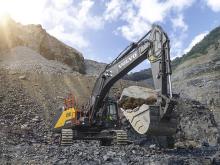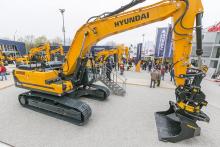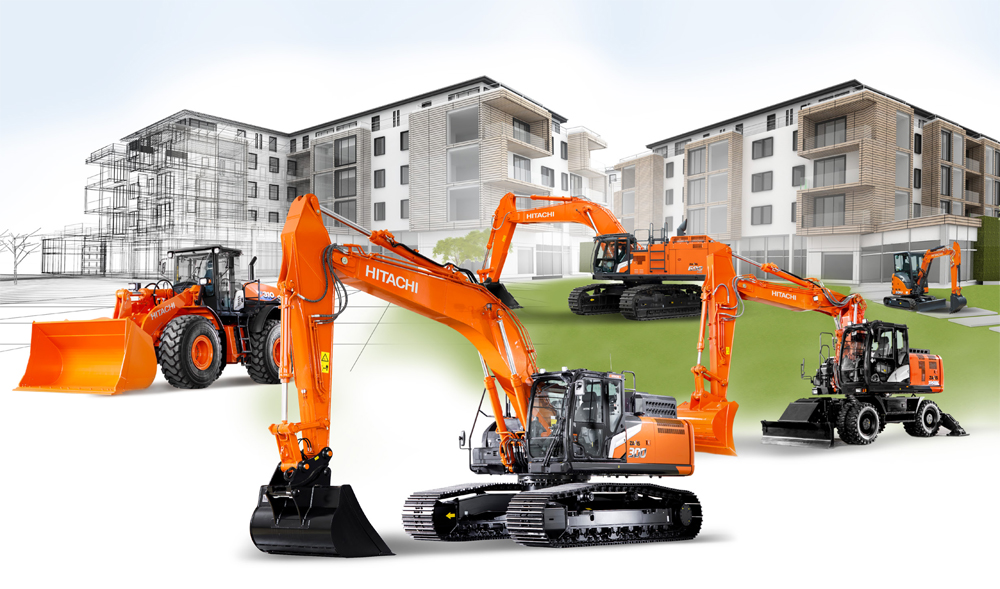
Click HERE if you would like to see a PDF version of this White Paper from Hitachi.
The European equipment rental market is worth €28 billion a year and is growing year on year, according to statistics from the European Rental Association (ERA). Europe’s rental businesses are spending €5 billion a year on new fleets, providing users with the latest machines.
This white paper will discuss the reasons behind this growth, particularly against the backdrop of the rise of the sharing economy, and the potential that rental offers to increase the efficiency of equipment use and cut carbon emissions.
It will also outline the benefits of rental construction equipment to contractors, particularly in the light of the COVID-19 pandemic. These include minimal financial risk, with fixed costs and flexible contract conditions to respond to fluctuating market demands.
A rise in rental opportunities
The rental industry is growing in the European construction market, continuing to outstrip that of the general economy. The ERA had forecasted rental growth of 4.8% this year, prior to the COVID-19 outbreak, following the same rateof growth in 2019. This is considerably more than general GDP growth, and also in excess of the construction growth forecasts for the period.
In France, for example, growth in equipment sales for 2018 was driven by wheel loaders, which were 11% higher than in 2017. This was said to be because of a sharp increase in sales to rental companies, which grew by 91% [1].
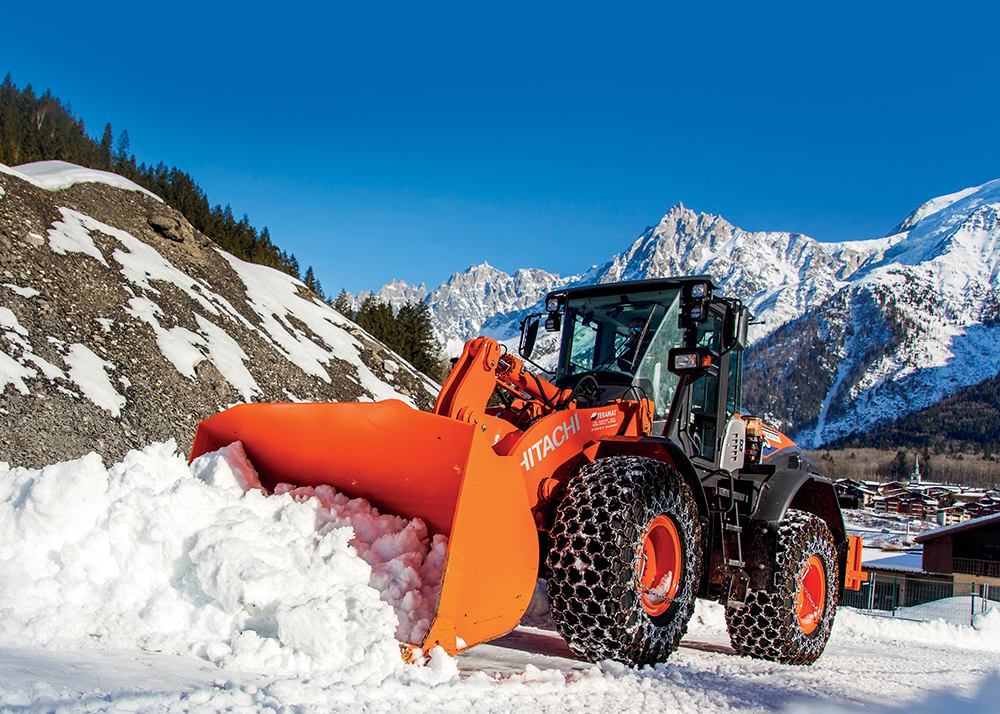
According to the ERA’s Equipment Rental Industry Report, 2019 [2], one of the reasons behind this growth is that customers have a better understanding of the advantages of using rental equipment. They can save money byusing rental services and have access to modern and technologically advanced equipment. It also provides flexibility and implies less capital expenditure.
Another key feature of the rental market, says the ERA, is the increasing size and sophistication of rental companies. Consolidation has played a role in the overall efficiency and promotion of the rental industry.
Thomas Allen, Editor of International Rental News, agrees: “The largest rental companies are getting bigger. For example: Loxam and Ramirent, the number one and number three rental companies in Europe agreed to amerger in 2019, creating a €2.3 billion rental business with activities in 22 European countries. The merger will make it three times larger by revenue than its nearest competitors, such as Kiloutou.” [3]
Observers of the world’s rental market have also been anticipating a move into Europe by the largest US rental businesses for several years. The largest of these, United Rentals, is a €7 billion business and already has a small division in Europe, added by its acquisition of BakerCorp in 2018.
In addition to rental companies, OEMs such as Hitachi Construction Machinery Co. Ltd, are taking advantage of growth opportunities in this area. Its global rental strategy department has assessed the needs of individual markets and responded accordingly.
In the US, for example, it acquired 33.3% shares in rental specialist ACME Lift Co. in 2018. In Europe, however, it has adopted a multichannel approach. This focuses primarily on a rent-to-rent programme that was launched via its comprehensive dealer network in 2017. Aside from this,
Hitachi has also invested in a UK-specific business, Synergy Hire, to target the largest rental market in Europe.
![Estimated equipment rental industry growth 2019 [2]](/sites/agg/files/inline-images/pic2_1.jpg)
“Hitachi was one of the first OEMs to introduce its rent- to-rent programme, Hitachi Premium Rental, in support of our dealer network in Europe,” says Rental Development Manager Arnold van Benthem at Hitachi Construction
Machinery (Europe) NV (HCME). “It has also entered the retail rental sector, where appropriate, as it needs to follow both channels so not to ignore a large part of the market,” adds HCME Rental Manager René Danielsson.
The shared economy
The growth of the rental industry is in line with a shift in mindset from ownership to access and the rise of the shared economy. According to research carried out in the USA by PwC [4], only one in two consumers agree with the statement that ‘owning things is a good way to show mystatus in society’. Four in five consumers agree that there are sometimes real advantages to renting over owning, such as making life more affordable and more convenient.
Rental offers customers more choice, while mitigating the costs associated with ownership, which can now feellike more of a burden, in terms of cost, maintenance, and potentially a lack of choice. Among US adults familiar with the sharing economy, 43% of consumers agree that owning today feels like a burden, and they are rethinking the value of ownership: 57% agree that access is the new ownership.
The PwC study also showed that the 18-24 age group is among the most enthusiastic about the sharing economy once they have tried it. As Richard Steinberg, CEO of DriveNow at BMW, says: “Millennials are not interested in spending their hard-earned money on buying a car, they’re not interested in parking, insurance, vehicle acquisition. But they still have mobility needs.”
This would suggest that in the near future, contractors will be less inclined to purchase new construction equipment, and more inclined to access it via the sharing business model, of which rental is an example.
Sharing environmental responsibility
In addition, the PwC study found that, among adults familiar with the sharing economy, 76% agree it’s better for the environment. The sharing economy is about efficient use of resource, and promotes sustainability, which is important for customers who are growing more environmentally aware.
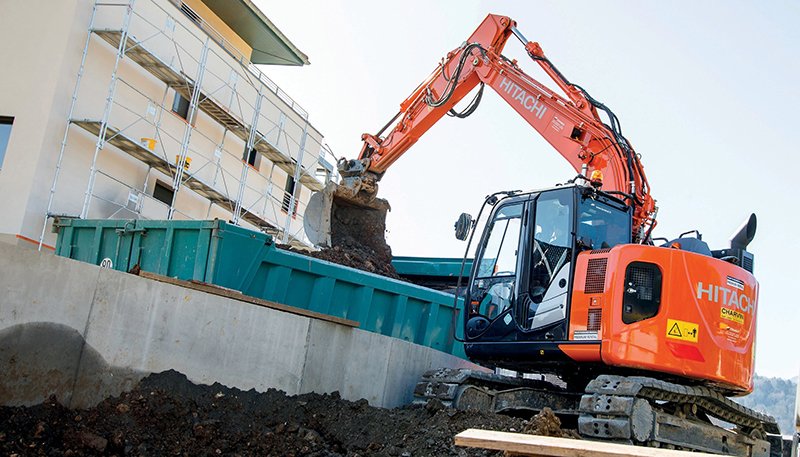
According to Daryl Weber, Global Director of Creative Strategy at Coca-Cola Company: “Anywhere where there is waste, like a car not being used, feels like an opportunity for sharing to come in and help reduce the waste.
“It’s an interesting mindset of millennials and new consumers, of not necessarily needing to own their own thing – everyone on the block doesn’t have to have their own lawnmower, so why don’t we pool together and share it and reduce over-consumption in the world?”
Four in five consumers agree there are real advantages to renting over owning.
Challenging times
Two challenges currently facing contractors in the construction industry have been identified for the purposes of this white paper. The first of which encompasses efficiency and flexibility – and is linked to the recent outbreak of COVID-19.
Prior to the pandemic, contractors were already looking for ways to work more efficiently and with greater flexibility. This will no doubt intensify when it comes to recovery from the expected economic slowdown.
Many will be looking to return to job sites quickly and win new tenders. However, they may not be in a financialposition to immediately invest in new machines – and the necessary attachments, tilt rotators and quick couplers required – that will enable them to do so.
Flexibility will continue to be an issue for contractors. As the outbreak has proved, the construction market can change rapidly and they need to be able to react quickly tounforeseen situations, avoid unexpected losses and protect their businesses. Having learnt some difficult lessons from the pandemic, construction machinery users will definitely seek out rental solutions to spread financial risk in the future.
Tackling emissionsThe second challenge faced by contractors is compliance to increasingly stringent emissions regulations, and therefore the ability to work in an environmentally efficient way.
According to the World Green Building Council [5], building and construction are responsible for 39% of all carbon emissions in the world, 11% of which is ‘upfront’ carbon associated with materials and construction processes throughout the building life cycle.
Reducing carbon emissions is crucial to fighting the climate crisis, and legislation at national, regional and city level is necessary to tackle the issue. Oslo, Norway, already hasa commitment to fossil-free construction sites, while the Finnish Ministry of Environment’s goal is to reach carbon neutrality by 2035.
To meet increasingly stringent emissions targets, contractors will be required to use the most technologically advanced machines, capable of low emissions and fuel consumption.
Building and construction are responsible for 39% of all carbon emissions [5].
The rent-to-rent concept
HCME’s response to the growth in demand for rental construction equipment was to introduce a rent-to-rent programme. It rents new Hitachi excavators, wheel loaders and mining equipment to its dealers, for them to then rent to customers.
At the end of the rental agreement, the customer has the option to buy the machine or alternatively return it to the dealer, who carries out any necessary refurbishment on behalf of HCME. The machine is then returned to HCME or remains with the dealer to be used/sold as approved used equipment under the Hitachi Premium Used brand.
By 2020, HCME had planned to have a Premium Rental fleet of 1,000 excavators and wheel loaders. In 2018- 19, it invested €40 million in new machines to set up theprogramme, increasing to €100 million in 2019-20. Eligible machines include wheel loaders from 152 to 311HP, and eight to 50-tonne excavators.
Meeting the challenge: efficiency and flexibility The Hitachi rental concept provides a risk-sharing opportunity, which is particularly advantageous duringeconomic downturns. Customers can pay as they earn with a Hitachi Premium Rental machine, returning it when the project ends, or taking rental payment holidays if required. This flexibility to respond to fluctuating market demands and the varying challenges of their businesses means minimal financial risk. The machines are easy to budget, with no unexpected costs.
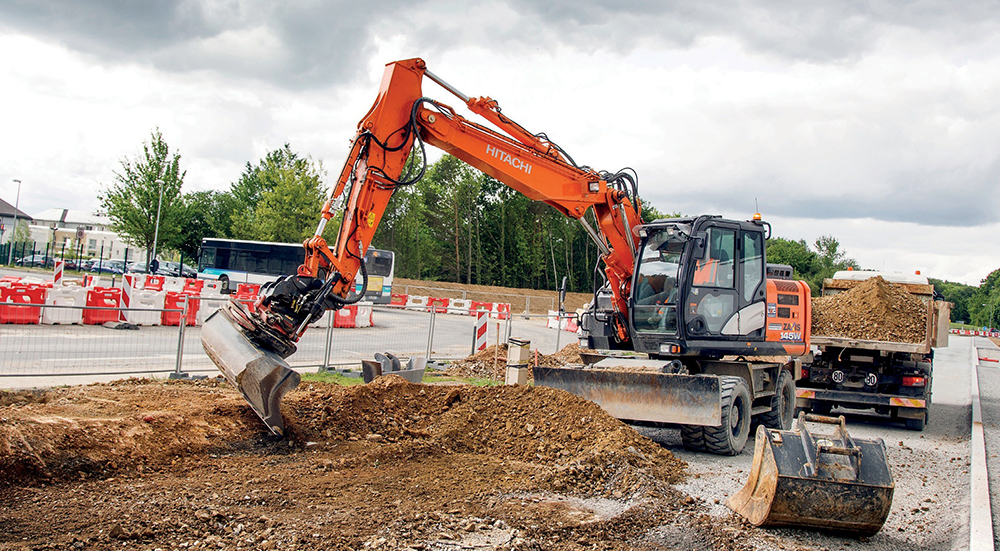
Contractors in France have experienced the benefits of added flexibility, minimal financial risk and convenience. Nicolas Munari rented an additional machine for a seasonal job near Chamonix Mont Blanc.
“I would rent a Hitachi wheel loader again, especially for a project with a time limit,” he says. “If you buy, you needa line of credit, but you can rent a machine for a short period without that. The expenditure stops when you return the machine.”
Similarly, Christophe Talarmin, Manager of the rental company, Société Robert Chevillard TP in Rennes, hired a wheeled excavator for work on a variety of earthmoving projects: “We like the flexibility of renting the Hitachi ZX145W-6. If there is no work, then there is no cost for this machine.”
Solution for economic uncertainty
In The Netherlands, demand for rental is growing in line with contractors needing a solution that will help them through any periods of economic uncertainty, says Gijs van Heertum, General Manager, Domestic Sales for Hitachi Construction Machinery Nederland (HCM Nederland): “They are now asking their dealer about these services, rather than a specialist rental company.
“There is a change in mindset among consumers, with same-day services now commonplace. Our customers arebringing that mentality to the workplace, with the expectation of Hitachi offering a complete solution.
“Our rental customers benefit from having fixed equipment costs for the duration of a project. They have more flexibility to supplement existing fleets – it used to be a case of finding work for the machine, but now it’s finding a machine forthe work.”
One of HCM Nederland’s customers, KB Group, expanded its existing Hitachi fleet by renting a ZW310-6 and ZW370-6 for its raw material processing activities at Amsterdam’s Western Port. Group Director Jan-Otto van Olst says: “The biggest benefit of hiring the Hitachi wheel loaders is the peace of mind that comes from knowing our fixed running costs.
“In addition, the market can change rapidly, and the KB Group needs to react quickly. Rental helps us to avoid any unexpected losses with this in mind.”
Reducing the burden of ownership
Renting equipment not only means greater options for customers, but also an enhanced experience and service. This helps to reduce the burden of ownership, providing peace of mind that running costs are fixed, and machines are well maintained and serviced for maximum availability.
In Italy, Tampieri Group has been renting wheel loaders from Hitachi dealer SCAI for eight years. “We don’t want to think about the machines after the contract has been signed and we like to have a fixed cost, so that there are no unknowns,” says Purchasing Director Franco Tampieri.

The technical support is also valued by this customer, a leading sunflower and grape seed oil producer, as the wheel loaders are critical to its production process. Pietro Tampieri, Purchase Department Coordinator, says: “It’s not just the capital cost of the machines you have to consider, but also the running costs. As the machines operate 24/7, our rental agreement with SCAI is successful because the technical support is fast, and keeps them up and running at all times.
“It’s all about peace of mind and that’s the most important thing about renting the wheel loaders. If there are any issues, then we just call SCAI. If there’s a technical issue that can’t be resolved within one day for whatever reason, then they would supply us with another machine.”
"We like to have a fixed cost, so that there are no unknowns".
Meeting the challenge: emissions
The ERA published independent research in 2019 showing that carbon emissions could be cut by more than 50% when machines are used efficiently – with rental being one example of efficient use.
By providing a wide range of equipment, rental allows customers to choose the right machine for the job, which maximises efficiency. Rental equipment usually travels shorter distances, with depots commonly located close to customers. In addition, delivery trucks rarely return empty, leading to fewer road emissions.
Rental also increases the utilisation rate of each item of equipment, therefore decreasing the amount of idle machinery and reducing energy consumption. And, as mentioned above, rental equipment is well maintained, ensuring it can work better for longer.
Maintenance is particularly relevant, given that rental machines are the most technologically advanced available to ensure high performance with the lowest emissions.
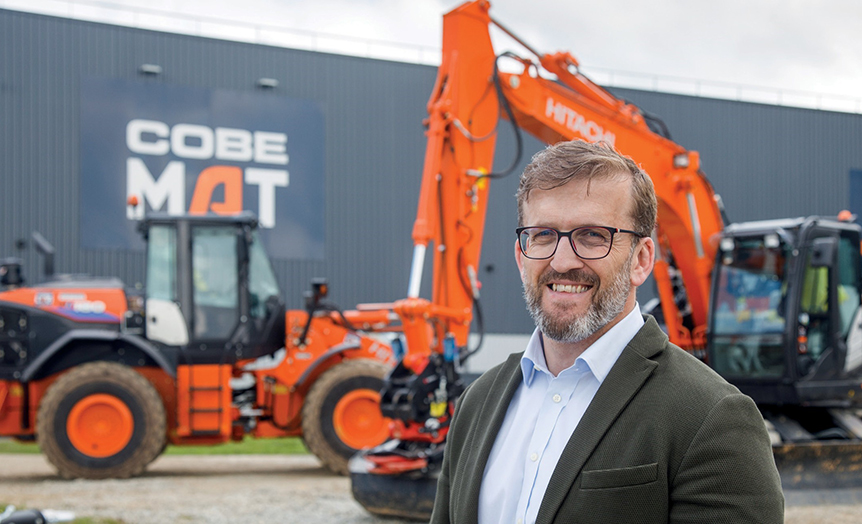
Such technology is highly sought after particularly among younger customers, as David Rodier, Managing Director of Cobemat, the authorised Hitachi dealer in north-west France, explains: “The philosophy of younger people is to change to faster models and upgrade to new technology quicker than previous generations.”
As this technology develops to keep pace with increasingly tough emissions regulations, however, maintenance becomes more complex and customers find it more difficult to do themselves. As Pietro Tampieri highlights: “If you buy machines, you are also responsible for their maintenance and servicing. This isn’t our area of expertise.”
“The philosophy of younger people is to change to faster models and upgrade to new technology quicker than previous generations.” David Rodier, Managing Director, Cobemat
Conclusion
The rental industry is growing in the European construction market, continuing to outstrip that of the general economy. Contractors are becoming more aware of the advantages rental offers over the purchase of construction equipment, such as saving money, easy access to a wider range of technologically advanced equipment and greaterfinancial flexibility.
Europe’s rental companies and OEMs are responding to these developments, increasing choice and servicequality for customers. Rental companies are consolidating, while manufacturers are responding to the needs of individual markets in various ways. Hitachi has adopted a multichannel approach in its territories – entering the retail rental sector (in the UK) and introducing a rent-to-rent programme via its European dealer network.
The growth of the rental market is in line with the rise of the sharing economy, a shift in mindset from ownership to access, and increasing environmental awareness.In future, contractors will be less inclined to purchase new construction equipment and will be more likely to access it via the sharing business model, of which rental is an example.
In light of the COVID-19 pandemic, rental will become even more valuable to the construction industry as it recovers from economic downturn, by offering customers peace of mind with minimal financial risk, flexible contract conditions and fixed costs. Customers can pay as they earn, returning machines when a project ends, or taking payment holidays when required.
Rental companies can provide immediate access to machines as job sites start to open again. In Switzerland, for example, they have been quick to react to the need for machines to build extensions to schools to create more space in the post-lockdown period.
As a consequence of the lockdown in several European territories, digitalisation in the rental industry has been accelerated. Larger companies such as Loxam now offer customers the opportunity to reserve and pay for their machines online and collect from local branches without going to the counter. The rapid development of contactless and online transactions is one example of how the rental industry is able to quickly adapt to changing situations and meet the needs of customers.
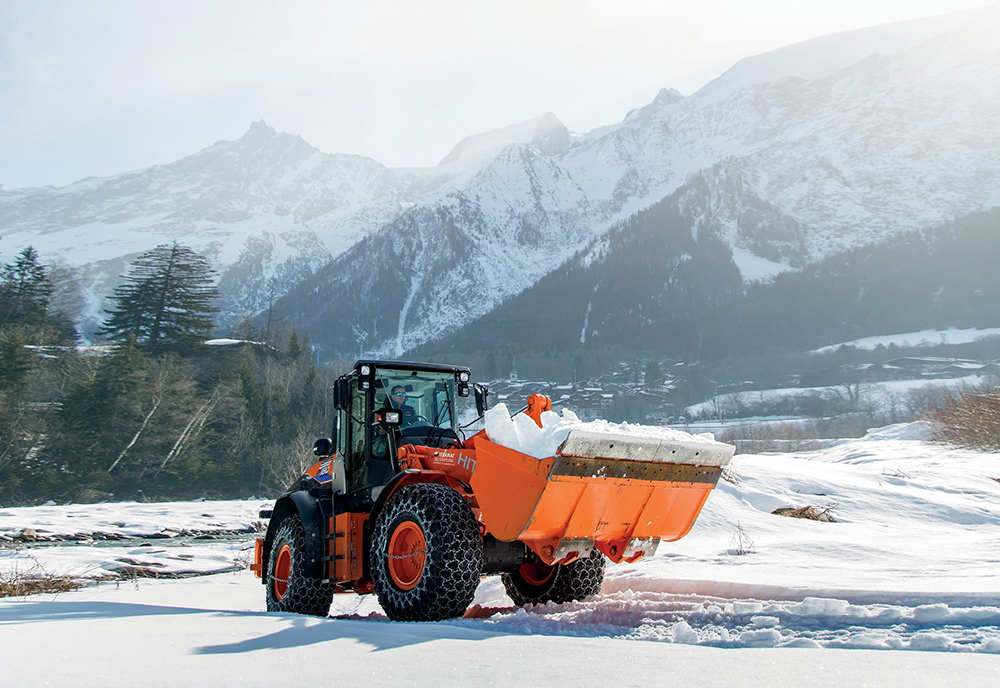
However, customer relationships cannot easily be managed via digital tools and apps, and there is still much to besaid for the enhanced experience and services that manufacturers and rental companies provide. An important element of this is their role in taking responsibility for increasingly complex maintenance and ensuring maximum availability, therefore reducing the burden of ownership.
In view of the climate crisis, rental offers an affordable and convenient opportunity to significantly cut carbon emissions. Customers have a wider choice of equipment,enabling them to choose the most efficient machine for the job. Rental fleets are made up of the most technologically advanced and well maintained machines, capable of low emissions and fuel consumption, which enables contractors to meet increasingly stringent emissions targets. Rental also increases the utilisation rate of each item of equipment, ultimately reducing energy consumption.
References
- CISMA data reported in Construction Europe (“French earthmoving equipment sales up”), January 2019
- European Rental Association’s Equipment Rental Industry Report, 2019
- Ground Control magazine, issue 28, Autumn 2019 (“Rental revolution”)
- The Sharing Economy, Consumer Intelligence Series, PwC
- World Green Building Council, https://www.worldgbc.org/news-media/WorldGBC-embodied-carbon-report-published
Click HERE if you would like to see a PDF White Paper from Hitachi.



